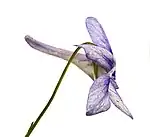Viola rostrata
Viola rostrata, commonly called the long-spurred violet, is an herbaceous plant in the violet family (Violaceae). It is native to eastern North America, where it is found in Canada and the United States, primarily in the Northeastern, Midwestern, and Appalachian regions.[1] Its natural habitat is acidic mesic forests, often growing near Tsuga canadensis.[2]
| Viola rostrata | |
|---|---|
 | |
| Scientific classification | |
| Kingdom: | Plantae |
| Clade: | Tracheophytes |
| Clade: | Angiosperms |
| Clade: | Eudicots |
| Clade: | Rosids |
| Order: | Malpighiales |
| Family: | Violaceae |
| Genus: | Viola |
| Species: | V. rostrata |
| Binomial name | |
| Viola rostrata | |
Description
It is a stemmed perennial plant. The cauline leaves are simple, toothed, ovate and acute. Basal leaves are cordate and 2–4 cm. It produces flowers in the spring. The flowers are beardless, pale lilac with darker veins forming a darker centre eye.[3] The spur is at least as long as the petal blades.[4]
 V. rostrata can be distinguished from other Viola by its long spur
V. rostrata can be distinguished from other Viola by its long spur
Hybrids
Viola rostrata is known to hybridize with Viola conspersa (American dog-violet) and Viola striata (creamy violet).[3]
References
- "Viola rostrata". County-level distribution map from the North American Plant Atlas (NAPA). Biota of North America Program (BONAP). 2014. Retrieved 22 January 2018.
- Alan Weakley (2015). "Flora of the Southern and Mid-Atlantic States".
- Gleason, Henry A and Arthur Cronquist. 1991. Manual of vascular plants of northeastern United States and adjacent Canada, 2nd ed. New York Botanical Gardens, New York, New York.
- Rhoads, Ann Fowler and Timothy A Block. 2007. Plants of Pennsylvania: an illustrated manual, 2nd ed. University of Pennsylvania Press, Philadelphia.